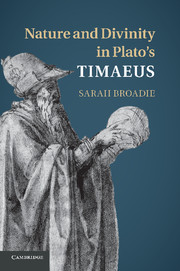Book contents
- Frontmatter
- Contents
- Acknowledgements
- What lies ahead
- Chapter 1 The separateness of the Demiurge
- Chapter 2 Paradigms and epistemic possibilities
- Chapter 3 The metaphysics of the paradigm
- Chapter 4 Immortal intellect under mortal conditions
- Chapter 5 The Timaeus–Critias complex
- Chapter 6 The genesis of the four elements
- Chapter 7 Divine and natural causation
- In conclusion
- Appendix on ‘parts of the paradigm’
- References
- General index
- Index locorum
Chapter 6 - The genesis of the four elements
Published online by Cambridge University Press: 05 December 2011
- Frontmatter
- Contents
- Acknowledgements
- What lies ahead
- Chapter 1 The separateness of the Demiurge
- Chapter 2 Paradigms and epistemic possibilities
- Chapter 3 The metaphysics of the paradigm
- Chapter 4 Immortal intellect under mortal conditions
- Chapter 5 The Timaeus–Critias complex
- Chapter 6 The genesis of the four elements
- Chapter 7 Divine and natural causation
- In conclusion
- Appendix on ‘parts of the paradigm’
- References
- General index
- Index locorum
Summary
Two kinds of causes
The concerns of this chapter have their roots in the moment when, in Timaeus’s narrative, the divine demiurgic ancillaries ‘take over’ (paralambanein) the immortal souls created by the supreme Demiurge, and begin their task of ‘weaving’ mortal bodies on to them (42e6 ff.; cf. 41d1–2). Timaeus launches this episode by focusing on the entirely new kinetic and cognitive situation in which the immortal soul is placed when joined to the mortal body. At first the soul is in near chaos because of the impulses from the body and from the environment. But in the natural course of things, the ‘stream of growth and nutriment’ becomes less violent with time; the soul’s immortal revolutions take advantage of the calm and become more stable (43a4–44b7). The narrative now bifurcates into a path about what human education can do to perfect the revolutions in mortals, and a path about the help afforded by nature, i.e. the demiurgic provision. The first path is only sketched at this point (44b8–c4; cf. 47b6–e2; 90c6–d5), and now for a while we follow the second. We begin to be shown specific anatomical arrangements. The immortal revolutions are naturally housed in the head, and the rest of the body is to serve the head. First and foremost, limbs of locomotion are needed for transport, as required by the head, and a distinction is needed between forwards and backwards motion, and therefore between the front and the back of the body. The front is distinguished by the face, into which the gods bound ‘organs’. First they created ‘light-bearing eyes’. Timaeus now proceeds to explain the formation of the eyes (toia(i)de aitia(i), 45b3–4). These organs are constructed so that a pure, non-burning, kind of fire (and no other kind) within the body may stream out to coalesce with the external daylight along its path, as a result of which the visual stream collides with external objects and distributes the consequent motions through the whole body to the soul – whereby there is seeing of those objects (45b2 ff.). Timaeus confirms this theory of the physics of vision by showing how it explains why we cannot see in the dark (45d3–e2); how it helps to explain dream-images; and how it explains various mirror-image phenomena (45e3–46c6).
- Type
- Chapter
- Information
- Nature and Divinity in Plato's Timaeus , pp. 173 - 242Publisher: Cambridge University PressPrint publication year: 2011



